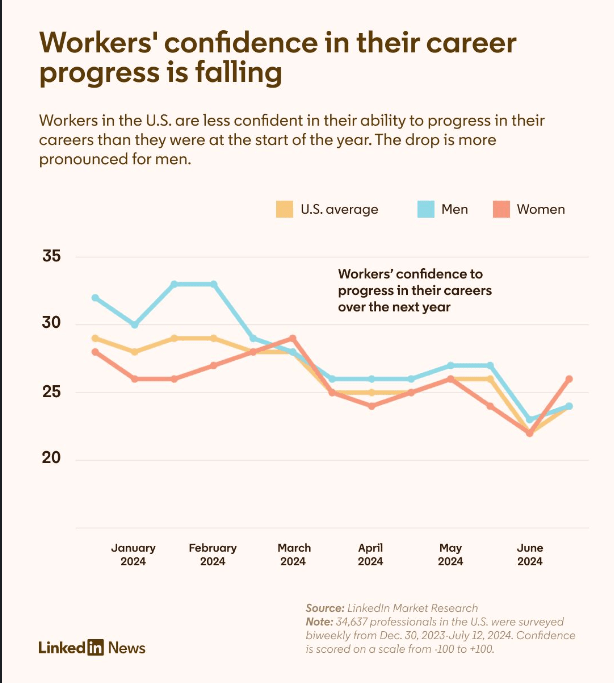
LinkedIn News Market Research reports that workers confidence in their careers is failing. The report reads:
American workers’ confidence in their careers has hit new lows, according to the results of LinkedIn’s latest Workforce Confidence survey. That drop is particularly pronounced for men, who have historically reported higher rates of career confidence than women.
LinkedIn Market Research
It got me thinking would entrepreneurship be any better? Well it depends.
Entrepreneurship is fraught with risk. MOST businesses fail. However, many businesses do succeed and thrive.
What do YOU want to do. Do you live working with a team and working within a structure that’s more or less been already defined and works?
Do you have the skills, patience, aptitude and desire to FIGURE OUT the game of entrepreneurship.
There’s no right or wrong about working for yourself or working for a company. Can you find out what you LOVE to do and how you can get paid doing it. That’s the “sweet spot” of employment or making money success.
Here’s a blog post on deciding between working for a company or starting your own business:
Should You Work for a Company or Start Your Own Business?
Choosing between a traditional career path and entrepreneurship is a significant decision that can impact your life in numerous ways. This post will explore the key factors to consider when making this choice, including risk, happiness, family considerations, financial aspects, and personal fulfillment.
The Corporate Path: Pros and Cons
Benefits of Working for a Company:
- Stability and predictable income
- Structured environment and clear expectations
- Benefits like health insurance and retirement plans
- Opportunities for professional development and networking
- Less personal financial risk
Downsides of Corporate Life:
- Limited control over your work and schedule
- Potential for job dissatisfaction or burnout
- Capped earning potential in many cases
- Less flexibility and autonomy
- Risk of layoffs or company restructuring
The Entrepreneurial Journey: Advantages and Challenges
Benefits of Entrepreneurship:
- Freedom to pursue your passion and work in your “zone of genius”
- Unlimited earning potential
- Flexibility in work hours and location
- Ability to create something meaningful and impactful
- Personal and professional growth opportunities
Downsides of Entrepreneurship:
- Financial instability, especially in the early stages
- High stress and long working hours
- Responsibility for all aspects of the business
- Potential for failure and personal financial risk
- Challenges in maintaining work-life balance
Key Considerations
- Risk Tolerance:
Entrepreneurship inherently carries more risk than traditional employment. Assess your comfort level with uncertainty and your ability to handle potential financial setbacks. - Family Responsibilities:
Consider how your choice will impact your ability to provide for and spend time with your family. A stable job might offer more security, while entrepreneurship could provide more flexibility but less predictability. - Financial Goals vs. Personal Happiness:
Reflect on what truly matters to you. Is it more important to maximize your earning potential or to find work that brings you joy? Sometimes these align, but often there are trade-offs. - Being Paid to Do What You Love:
Finding a job that aligns with your passions can be incredibly fulfilling. However, turning your passion into a business can sometimes lead to burnout or a loss of enjoyment. - Contentment in Less Passionate Work:
It’s possible to find satisfaction in a job that isn’t your dream career. Many people find fulfillment through other aspects of their lives while maintaining a stable job that supports their lifestyle. - Your “Zone of Genius”:
This concept refers to the intersection of your natural talents and passions. Consider whether your zone of genius is better suited to a corporate environment or entrepreneurship. - Long-term Goals:
Think about where you want to be in 5, 10, or 20 years. Which path is more likely to help you achieve those goals? - Personal Growth:
Both paths offer opportunities for growth, but in different ways. Entrepreneurship often provides a steeper learning curve, while corporate jobs may offer more structured development programs. - Work-Life Balance:
Consider how each option aligns with your desired lifestyle and personal commitments. - Support Network:
Assess the support you have from family, friends, and mentors for each path.
Making Your Decision
Ultimately, the choice between working for a company and starting your own business is deeply personal. It depends on your individual circumstances, goals, and values. Some people find great satisfaction in climbing the corporate ladder, while others thrive on the challenges and rewards of entrepreneurship.
Remember that this doesn’t have to be a permanent decision. Many successful entrepreneurs start their careers in corporate jobs, gaining experience and skills before venturing out on their own. Conversely, some business owners eventually transition to corporate roles for various reasons.
The key is to make an informed decision based on honest self-reflection and a clear understanding of what each path entails. Whichever route you choose, commit to it fully and be prepared to adapt as your circumstances and goals evolve over time.
Would you like me to expand on any specific aspect of this blog post?
Related articles











